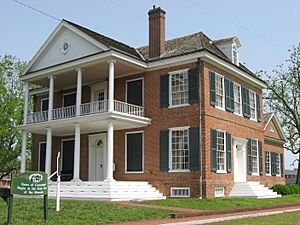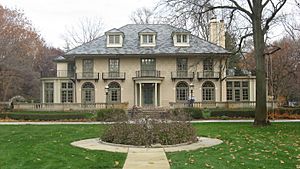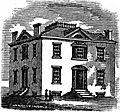Indiana Governor's Residence facts for kids
Quick facts for kids Governor's Residence of Indiana |
|
|---|---|
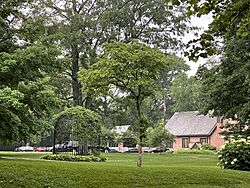
Indiana Governor's Residence in 2022
|
|
| General information | |
| Type | House |
| Architectural style | English Tudor |
| Location | 4750 N. Meridian Street, Indianapolis, Indiana |
| Construction started | 1928 |
| Governing body | Governor's Residence Commission |
| Technical details | |
| Floor area | 10,500 sq ft (980 m2) |
| Design and construction | |
| Architect | Rubush & Hunter |
The Indiana Governor's Residence is the official home for the family of the governor of Indiana. It is located in Indianapolis, Indiana. This house has been used since 1973. It is the sixth official home for Indiana's governors. The current governor living there is Mike Braun.
Contents
The Governor's Home Today
The Indiana Governor's Residence is in a historic area. This area is around North Meridian Street in Indianapolis, Indiana. The home sits on a large property of about 6.5 acres. Its address is 4750 North Meridian Street.
How the Current Home Was Built
The house was built in 1928 for a person named Scott Wadley. The architects who designed it were from the company Rubush & Hunter. It is an English Tudor style home. The state of Indiana bought the house in 1973. They bought it from attorney C. Severin Buschman for $242,000.
After buying it, the state spent about $800,000 to fix it up. A grant from the Lilly Endowment helped with $125,000 of these costs. The updates included adding air conditioning and new electrical wiring.
What the Residence Looks Like
The home is about 10,500 square feet in size. It has twenty-three rooms and eleven bathrooms. This is a typical size for an English Tudor home. It looks like many other houses built in the neighborhood around the same time.
Even though it looks similar, it is special inside. Its main support and foundation are made of concrete. Most Tudor homes are built entirely from wood.
Visiting the Governor's Residence
The first floor of the home is open to the public. You can take tours regularly to see it. The rooms you can visit include the main entrance, a library, and the formal living room. There are also formal and informal dining rooms, a sun porch, a kitchen, and a butler's pantry. There is also a space for events.
The second floor is private. It is where the governor's family lives. This area is not open to the public. About 10,000 people visit the home each year.
Past Homes for Indiana's Governors
Indiana has had several official homes for its governors. Before Indiana became a state, it was a territory. The Indiana Territory had two governors.
Early Territorial Homes
The first territorial governor was William Henry Harrison. He built a large home in Vincennes in 1804. He called it Grouseland because of the many birds there. It was one of the first brick buildings in the territory. Today, Grouseland is still standing and is a National Historic Landmark.
The second territorial governor was Thomas Posey. He had a home built in Corydon. But he only lived there for a short time. He then moved to Jeffersonville and rented a room. The Posey House is now part of a historic district.
First State Governor's Homes
Since Indiana became a state, there have been six official homes for governors. However, only five of them were actually lived in by the governor's family. There were also four other unofficial homes. Governors lived in these when no other official place was ready.
The first official home for a state governor was in Corydon. It was on a small hill near the first statehouse. Governor Jonathan Jennings and his wife lived there from 1816 to 1822. Important visitors like U.S. Presidents Andrew Jackson and James Monroe visited this home. The building is no longer there. A new home stands on its original foundation.
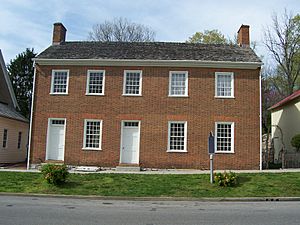
Governor William Hendricks also lived in Corydon. He stayed at the Governor Hendricks Headquarters. This was an unofficial home. Hendricks bought it from Davis Floyd. It was on the same block as Jennings' home. Floyd had built the house for himself. But he lost it after the Panic of 1819. Hendricks lived there during his time as governor, from 1822 to 1825. He later sold the house.
Indianapolis Residences
The second official home for the state's governor was built in the center of Indianapolis. Today, the Indiana Soldiers' and Sailors' Monument stands there. Alexander Ralston designed this mansion. He also planned most of the city. The mansion cost $6,500 and was finished in 1827. This was during Governor James B. Ray's time.
Governor Ray's wife did not want to live in the home. She felt it had no privacy. So, no governor ever lived there. Instead, Indiana Chief Justice Isaac Blackford lived there from about 1830 to the 1850s. The building was torn down in the 1870s.
Since there was no good home for the governor, the state bought a house from Dr. John H. Sanders in 1837. This house was on the corner of Market and Illinois Streets in Indianapolis. The area was wet and unhealthy because of wetlands nearby. Governor James Whitcomb believed these conditions caused his wife's death. The home was left empty in 1861. Governor Oliver Morton briefly lived there but refused to stay. The house was sold during his term and later destroyed.
Governors did not have an official home again until 1919. The state bought a house at 101 East 27th St., Indianapolis, for $65,000. They spent another $20,000 to furnish it. Henry Kahn built this home in 1908. It looked like an English country house. The inside had a Gothic style. It had high, beamed ceilings and fancy Wilton carpeting. After some repairs, governors lived there from 1919 until 1945. The state sold the building to the Marott Hotel. The hotel wanted to make it a clubhouse. But they tore it down in 1962 to build a parking lot.
The fifth home for the governor was bought in 1945. It was at 4343 N. Meridian St. Harry Lane, an auditor, built this three-story home in 1924. It had 12 rooms and slanted roofs. It was famous for its golden bathroom fixtures and a tall, fancy iron fence. The home was sold two years later to J.H. Trimble. He lived there until he passed away in 1937. The state bought it from his widow for $72,000. It was the governor's home from 1945 until the current mansion was bought in 1973. The home was sold at an auction in 1973 to Robert L. Dawson. He then sold it to Dr. John C. Klein in 1978. This home is known as the William N. Thompson House. It was added to the National Register of Historic Places in 1982.
After the fifth home was sold, there was a short time when the current residence was being fixed up. During this time, Governors Edgar Whitcomb and Otis Bowen lived in Riley Towers. This building is at 650 N. Alabama St. The state rented the penthouse apartment for them. It cost $1,150 each month.
Images for kids
-
Home of Governor Thomas Posey in Corydon
-
Home of Jonathan Jennings, the first official governor's residence.
-
A sketch of the second official Governor's Mansion, located in Indianapolis
Governor's Residence Commission
A group called the Governor's Residence Commission helps take care of the governor's home. This group manages a special fund. It is part of the Indiana Public Building Foundation. This foundation is located at 4750 N. Meridian St., Indianapolis.
The commission was created in 1975. Its job is to oversee repairs and upkeep of the home. They also help plan events held there. In 2008, some members of the commission included Linda Goad, Sara Barclay, and David Collins. The commission gets some money from private donations. The governor chooses the members of the commission. They serve for as long as the governor decides. The commission meets every month. They report to the Office of the First Lady. The members do not get paid for their work. However, they are paid back for their expenses.
See also
 | Bayard Rustin |
 | Jeannette Carter |
 | Jeremiah A. Brown |


